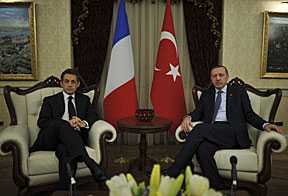 Al-Jazeera’s Beirut Bureau Chief Ghassan Ben Jeddo has resigned over what he described “biased” coverage of Middle East revolutions by the Qatari-based satellite channel.
Al-Jazeera’s Beirut Bureau Chief Ghassan Ben Jeddo has resigned over what he described “biased” coverage of Middle East revolutions by the Qatari-based satellite channel.
The renowned Tunisian-born journalist and television presenter tendered his resignation earlier this month for a number of reasons, most importantly Al-Jazeera’s “lack of professionalism and objectivity” in covering the ongoing revolutions in Middle Eastern countries, including Yemen and Bahrain, As-Safir reported Friday.
There has been no official confirmation from Al-Jazeera management as to whether Ghassan’s resignation has been accepted.
“Ghassan Ben Jeddo believes Al-Jazeera TV news channel no longer pursues an independent and unbiased policies, and quite conversely, is in pursuit of a certain type of policies regarding the brewing uprisings in the region,” As-Safir reported.
The Tunisian journalist said the Qatari-based satellite channel has launched a smear campaign against the Syrian government and has turned into “a propaganda outlet,” the report added.
The report added that while the station covered the events in Libya, Syria and Yemen, it barely mentioned the bloodshed in Bahrain.
People in Bahrain have been holding anti-government protests since February 14, demanding constitutional reforms as well as an end to the Al Khalifa monarchy.
Demonstrators maintain that they will continue to protest until their demands for freedom, constitutional monarchy, and a proportional voice in the government are met.
The peaceful popular movement in Bahrain has been violently repressed, leaving scores of anti-regime protesters killed and many others missing.
Prior to joining Al-Jazeera in 1997, Ben Jeddo worked for the BBC network, the London-based Al-Hayat daily and in a number of other Arab newspapers.
He is the only journalist to have interviewed the Hezbollah Secretary General Seyyed Hassan Nasrallah, during the Israel-Lebanon conflict. Ben Jeddo has also interviewed Leader of Lebanon’s Progressive Socialist Party Walid Jumblat and former Cuban leader Fidel Castro.
(Source: Press TV)
, April 24, 2011
Al-Jazeera journalist resigns over ‘incitement’
 Ghassan Bin Jeddo director of al-Jazeera’s office in Beirut protested against lack of objectivity in reporting of Arab world uprising
Ghassan Bin Jeddo director of al-Jazeera’s office in Beirut protested against lack of objectivity in reporting of Arab world uprising
Ghassan Bin Jeddo a prominent journalist and presenter in Qatar’s satellite TV channel al-Jazeera has resigned, citing the channel’s abandonment of its neutrality in the present unrest in the region.
The statement could not be independently corroborated despite reports that Bin Jeddo himself confirmed the news, published in the Arabic language Lebanese daily al-Safir.
Al-Safir had quoted “reliable sources” as saying that Bin Jeddo’s resignation was attributed to al-Jazeera’s alleged abandonment of professional and objective reporting, as it became “an operation room for incitement and mobilization.”
Another reason noted was its “provocative policy, which is “unacceptable, particularly in light of the historical stage the region is passing through,” it added. It stressed that Bin Jeddo’s resignation was morally motivated as al-Jazeera highlighted the developments in Libya, Yemen, and Syria but not Bahrain.
Asked if the resignation was related to the policy the channel has adopted in covering Syrian developments, the paper quoted a source as saying: “It’s an issue of principle and morality for him.”
About face
Al-Safir noted that after the 2005 assassination of the former Lebanese Prime Minister, Rafik Hariri, Bin Jeddo was banned from entering Syria for a year and a half because “he is an advocate of reform and freedom in that country.”
During the first weeks of the riots in Syria the al-Jazeera network completely ignored the protests and incured a great deal of criticism from government opposition in Damascus.
Following the criticism the Qatari network did an about face and now has the Syrian riots as its main story even going so far as to publish harsh images of protestors being killed by the regime supporters.
I t also offers Syrian human rights activists and resigning parliament members a platform to present their views.
Roee Nahmias contributed to this report
https://www.ynetnews.com/articles/0,7340,L-4060180,00.html, 24.04.2011






